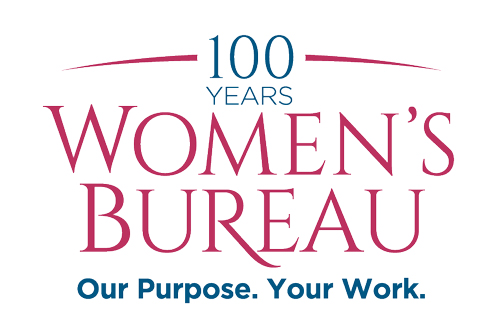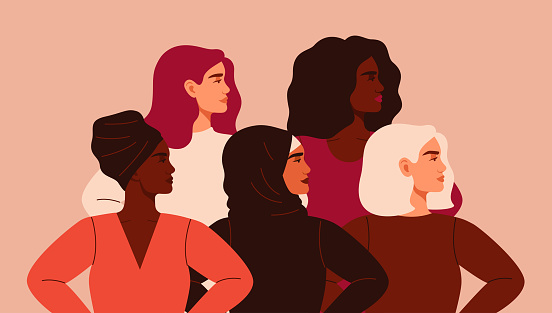
WB Deputy Director Retires after Decades of Service

“We must continue to take on challenges outside our comfort zone,” Women’s Bureau Deputy Director Joan Harrigan-Farrelly says often. Over the years, she has routinely encouraged staff, family and friends alike to become invested in their own growth. This has been the guiding principle of her career and a refrain that has seen her through decades of public service.
Joan’s career in the Federal government began with a fellowship at the United States Agency for International Development. At the time she was living in the Virgin Islands, but the fellowship required her to move to Washington D.C. She had no friends or family in D.C. and would have to begin carving out a new professional path and life, but she was up for the adventure. “It turned out to be one of the best decisions of my life,” Joan recalls.
After the fellowship ended, Joan decided that D.C. was just where she needed to be, so she started applying for jobs. The job hunt taught her many things, one of which was that finding the right path could take a while. Never one to be discouraged, Joan persisted until she landed a position at the Environmental Protection Agency, where she occupied progressively higher roles in her 14-year tenure there. In December 2012, Joan joined the WB team and has left an indelible mark on her colleagues and counterparts over the past 10 years.
“Try to move people with your actions, with your character, with the way you engage them,” Joan says. “I wasn’t always the subject matter expert in a meeting, but I would always approach members of my team with a willingness to learn.” In fact, Joan remembers attending meetings where her questions may have seemed tedious to the team of experts, but she never shied from asking them to explain concepts in detail and without technical language. “I wanted to make sure that regulations and policies I signed off on came from my own ability to weigh the different options based on my understanding,” Joan says. “It was also important to me that we were clearly communicating this information to the public.”
In her role as WB’s deputy director, Joan was responsible for the programs and operations of the Bureau. She focused on making sure both short-term plans and long-term strategies were in line with our overall mission of advocating for working women. As a leader, she applied all the lessons she accumulated from her years in public service to identify the challenges facing working women and develop the most fitting solutions. Joan affirmed the value of listening to individuals’ stories and amplifying their voices.
The WB team will remain committed to this important work. We will continue to be champions for working women, never losing our resolve, especially in trying times, to fight for women’s rights and opportunities. Thank you, Joan, for your inspirational example and for all that you’ve done over the years to advance our mission. Although bittersweet, we wish you a warm farewell and a happy retirement.
The Women’s Bureau is 102 Years Old

Did you know the Women’s Bureau is the only agency authorized by Congress to serve as a public policy advocate for working women? We just celebrated our 102nd anniversary earlier this month, and we’re not slowing down!
We’re a research and policy agency that studies the issues affecting women in the labor force. We use a combination of ‘superpowers’ to do our work:
- Evidence-based research and analysis to advocate for policies to improve employment outcomes for women;
- Education and outreach activities to employees, employers and community-based organizations through our national and regional offices; and
- Grant-making, including our two flagship grant programs: the Women in Apprenticeship and Nontraditional Occupations and the Fostering Access, Rights, and Equity grant programs.
We’re dedicated to improving the quality of jobs disproportionately held by women and dismantling the barriers that keep women from accessing high-quality, good-paying jobs – including by making childcare more affordable and accessible and investing in the care workforce.
On the Overturning of Roe v. Wade

WB Director Wendy Chun-Hoon issued a statement June 24 on the U.S. Supreme Court decision to overturn Roe v. Wade: “Research has shown – repeatedly and consistently – that reproductive autonomy is linked directly to a woman’s ability to get an education, participate in the labor force and increase their earning potential. It has also helped to narrow the gender wage gap.”
June Observance
LGBTQIA+ Rights are Human Rights

This month, we joined the White House in honoring the resilience of LGBTQIA+ communities fighting for safety, equality and protections inside and out of the workplace. We recognized the contributions of changemakers like Senator Tammy Baldwin, the first openly gay member of the U.S. Senate and Wisconsin’s first female Senator, and Representative Mauree Turner, the first nonbinary state legislator and first Muslim Oklahoma lawmaker.
- Read the White House Pride Month Proclamation
- Learn more about Senator Baldwin
- Find out about Representative Mauree Turner
Title IX at 50 and Beyond

June 23 was the 50th anniversary of Title IX being signed into law to ensure gender equity in higher education, including equal access to publicly funded resources in education and sports. Though best known for its impact on women’s sports, it also protects pregnant and parenting students, transgender students and victims of sexual harassment.
Juneteenth

Juneteenth became an official federal holiday last year, in recognition of the end of slavery in the United States on June 19, 1865, more than two years after President Abraham Lincoln issued the Emancipation Proclamation. We joined the rest of the country in reflecting on our nation’s history and on the work ahead to eliminate systems built on racism and inequity.
Equal Pay Act of 1963

On June 10, 1963, President John F. Kennedy signed the Equal Pay Act into law. This historic law helped reduce gender-based pay discrimination: If there is inequality in wages between men and women who perform substantially equal jobs, employers must raise wages to equalize pay but may not reduce the wages of other individuals.
Explore equal pay protections by state
Events and Partnerships
Advancing Diversity and Inclusion in Trucking – Last year, the departments of Transportation and Labor launched a Trucking Action Plan to identify effective and safe strategies to recruit, train and retain a diverse pool of truck drivers. To further this objective, on June 1, the WB and the Office of Apprenticeship cohosted a webinar to share ideas for creating and maintaining a safe working environment for female apprentices in the trucking industry.
U.S. Conference of Mayors – On June 5, WB Director Chun-Hoon and Senior Advisor Gayle Goldin attended this year’s U.S. Conference of Mayors and offered remarks on how mayors can reimagine their cities' gender equity framework for workforce development using federal investments from the American Rescue Plan and Bipartisan Infrastructure Law. Director Chun-Hoon spoke at the Women Mayors Leadership Alliance Plenary Session about how local leaders can foster equity for women and underrepresented communities in their approaches to workforce development.
AFL-CIO Annual Convention – June 12-15, WB Chief of Staff Nikkilia Lu attended the American Federation of Labor and Congress of Industrial Organizations (AFL-CIO) convention in Philadelphia, where the Department of Labor had a virtual booth for the first time. Lu was alongside Boston CLC President, the head of the Boston Building Trades, members of the Painters’ Union, apprentices and others to witness the election of Liz Shuler as first woman president of the AFL-CIO. Secretary of Labor Marty Walsh also attended and emphasized the importance of the labor movement to the nation’s economic recovery.
Equity in the Workplace: Trans Inclusion Webinar – WB hosted this event on June 22 to hear from trans-led advocacy organizations New York Transgender Advocacy Group, Trans Solutions Research and Resource Center, and Life is Work about the experience of transgender workers while looking for work and while working, and how we as employees, employers and stakeholders can help provide safe and nurturing spaces.
Good Jobs Summit – On June 21, the WB helped lead the Department of Labor’s Good Jobs Summit, gathering government, labor, and workforce leaders to discuss how to advance good quality jobs for all workers. WB Director Chun-Hoon moderated a panel on equity work being done in the Portland metro area to get more women and people of color into the construction trades. Following this conversation, the WB led a breakout session to examine different models of equity work across the country featuring Building Futures Rhode Island and Chicago Women in Trades.
- Watch the Good Jobs Summit
- Find out more about the impact of gender and racial inequality on women workers
WB-Cornell Equity in Focus: Clean Energy Jobs Webinar – On June 29, the WB and the Cornell ILR Worker Institute hosted the third webinar in our Equity in Focus series. The webinar, Building a Diverse, Inclusive Clean Energy Workforce, featured speakers from government, industry and research institutions, who discussed how the U.S. can tackle the climate crisis and create high-quality union jobs for women and frontline communities of color that suffer the most from climate change, pollution and historic inequities.
Fostering Access, Rights and Equity Grant Program

Apply through July 1, 2022 for this funding opportunity to help women who are paid low wages learn about and access their employment rights and benefits. Administered by the department’s Women’s Bureau and the Employment and Training Administration, the Fostering Access, Rights and Equity (FARE) grants support non-profit organizations that connect women workers to services, benefits and legal assistance.
- Learn more about FARE and our 2021 recipients
- Check out our Frequently Asked Questions
- Read the press release
Transportation Workforce Development Resources
With the unprecedented levels of public investment from the Infrastructure Investment and Jobs Act, the Department of Transportation, in partnership with DOL, has released a series of products on workforce development and local and economic hiring preferences:
- The DOT fact sheet details how states can use highway funding for supportive services and workforce development.
- DOT and DOL collaborated on a set of questions and answers on how states can create a skilled and diverse workforce for infrastructure projects through registered apprenticeship.
- A new Q&A provides expanded information on local and economic hiring preferences, explicitly focusing on creating workforce development programs that target economically disadvantaged groups, including people on public assistance, people with lower levels of formal education, and people with criminal convictions.
In Case You Missed It
For Women, Access to Family-Friendly Work Policies Varied Dramatically Prior to COVID
“Even before the pandemic, there were ‘haves’ and ‘have nots’ in the workplace. Not just in terms of wage inequality, but also in terms of access to family-friendly jobs that allowed workers to accommodate their personal needs. While some workers had the freedom to take advantage of these policies, many – especially women of color and those with less education – did not.”
Minding the Gap: How Better Care Policies Can Help Families Balance Work and Home
“Longstanding gender stereotypes perpetuate the notion that men work for pay outside the home in order to provide financially for their families, while women assume responsibility for the majority of unpaid household work. While this does not reflect the reality of most families’ lives, the impact of these norms persists.”
Celebrating Title IX | June 30, 12–1 p.m. ET

We Want to Hear from You!

“Occupational segregation” is the gendered division of men and women into different types of jobs. It leads to women being overrepresented in certain jobs, which are generally valued and compensated less than male-dominated jobs.
We’ve heard from many working women about their experiences with gendered job expectations, the challenges they face at work, the supports that help them thrive, and the policy changes that would help them succeed.
Follow the Women’s Bureau on Twitter: @WB_DOL

The Women’s Bureau has championed the rights of working women and served as a convener of conversations critical to an equitable economy for women for more than 100 years.
Follow us at @WB_DOL to view our #ThrowbackThursday series highlighting pioneering women, and to learn more about the latest research, initiatives, policies, and updates related to working women and their families.
